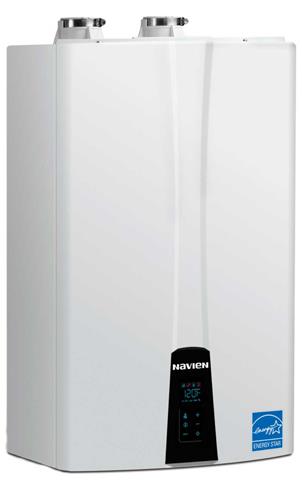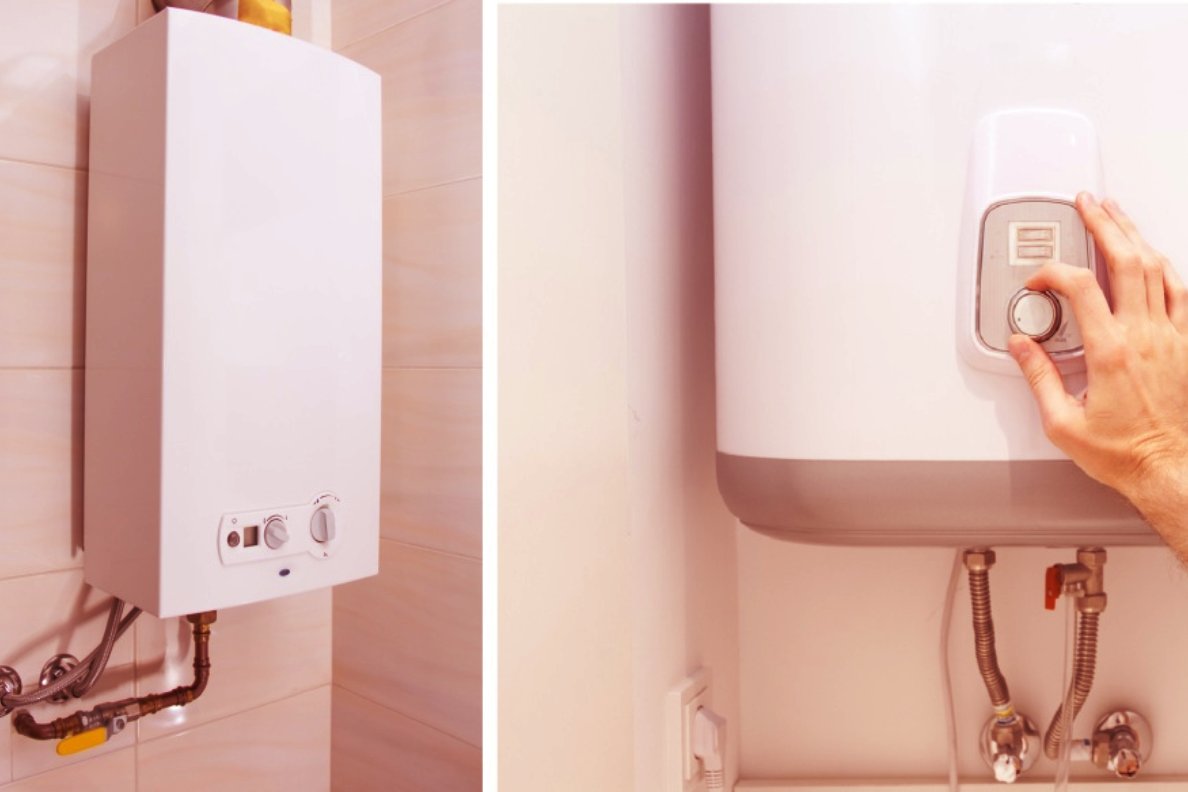Learning About The Upsides Of Continuous-Flow Water Heaters
Learning About The Upsides Of Continuous-Flow Water Heaters
Blog Article
Were you searching for facts involving 5 Benefits of Tankless Water Heaters?

In a world where comfort and efficiency reign supreme, it's not a surprise that house owners are continuously looking for smarter ways to manage their home's energy consumption and convenience. One advancement that has steadily gained popularity is the tankless hot water heater. Yet just what makes these systems stand apart from the standard tank-based designs the majority of us matured with? Let's dive in and check out the advantages of tankless water heaters, helping you decide if it's time to make the switch in your home.
Introduction
Picture this: you enter the shower after a long day, anticipating a calming waterfall of warm water, only to be welcomed by icy droplets due to the fact that the last person utilized it all up. Noise familiar? Typical hot water heater store a set amount of hot water, suggesting you go to the grace of that tank's supply. Tankless systems, on the other hand, warmth water on demand. No more running out mid-shower, say goodbye to fumbling with timetables simply to ensure hot water is offered.
Comprehending Tankless Hot Water Heater
What Are Tankless Hot Water Heater?
Tankless water heaters, often known as on-demand or instantaneous water heaters, provide hot water just as it's needed. As opposed to keeping gallons of pre-heated water, these systems kick into action the moment you activate the faucet. Water passes through a heat exchanger, heating up in real-time, suggesting you get a nonstop flow of warm water without the demand for a big tank resting idly by.
Just how Do They Differ from Conventional Systems?
Traditional heating systems hold a reservoir of hot water, using energy to keep that container at a consistent temperature level. Tankless devices remove the standing supply, reducing thrown away energy and the cumbersome impact of a large cylinder. Essentially, you're updating from a "accumulation" way of thinking to a "made-to-order" approach.
Common Kinds Of Tankless Systems
Tankless water heaters typically can be found in 2 varieties: gas and electric. Gas models often tend to provide greater flow prices, perfect for larger families, while electrical models typically offer smaller sized homes and are generally less complicated to install. In addition, some systems are developed for point-of-use (serving one fixture) while others can handle the entire home's hot water demands.
Trick Advantages of Tankless Water Heaters
1. Countless Warm Water Supply
Ever before had to arrange showers so everyone gets their reasonable share of warm water? With tankless, that comes to be a distant memory. As long as the heating unit's flow ability isn't surpassed, you can take back-to-back showers without becoming a popsicle.
2. Energy Effectiveness and Cost Financial Savings
No more warming a giant tank's worth of water and keeping it cozy throughout the day. Tankless heating systems lower standby power losses, which can reduce energy costs. While the preliminary cost could be greater, the long-lasting cost savings often justify the financial investment.
3. Space-Saving Layout
If your home is short on storage, removing the large container liberates valuable area. Tankless devices are compact and can commonly be mounted on walls, tucked away in corners, or mounted in tight utility wardrobes without monopolizing the entire room.
4. Longer Lifespan
A well-maintained tankless hot water heater can outlast its tank-based cousin. Typical storage tanks could last 10-15 years, while tankless models can keep downing along for two decades or even more, making them a strong investment gradually.
5. Improved Water High Quality
Saving water in a storage tank can sometimes cause debris buildup or a slightly "off" preference. With tankless systems, fresh water is heated instantly, decreasing the possibilities of debris accumulation and potentially offering cleaner-tasting water.
Factors to consider Before Changing
Though the advantages are engaging, it's smart to consider a few variables prior to totally devoting.
First Financial Investment Expenses
Tankless heating units commonly include a higher upfront price tag. Between the unit itself and possible setup modifications, the initial expense might provide you sticker label shock. But bear in mind to see it as a long-lasting investment.
Setup Needs
Depending on your home's infrastructure, you may require extra electrical capability or gas line upgrades. Guarantee you comprehend the installation demands and consult with an expert to stay clear of shocks.
Evaluating Your Home's Water Usage Patterns
If your household concurrently uses several components with high hot water need, make sure the system's flow rate satisfies your needs. Knowing your use patterns helps you pick the appropriate dimension and type of tankless heater.
Maintenance and Care Tips
Tankless systems are relatively low maintenance, however they aren't set-it-and-forget-it devices.
Normal Cleansing and Descaling
Hard water minerals can develop in the warm exchanger, influencing performance. Routine descaling (commonly advised every year) maintains the system going for peak performance.
Annual Professional Evaluations
A yearly checkup from an expert makes certain small concerns are caught early. They'll examine the device's performance, search for leakages, and aid maintain optimal effectiveness.
Making Certain Correct Ventilation
For gas models, proper ventilation is necessary to safely remove exhaust gases. Make certain airing vent systems are clean and properly installed to prevent any possible safety and security threats.
Contrasting Different Brands and Versions
Not all tankless hot water heater are produced equal.
Researching Dependable Manufacturers
Search for credible brands with a background of generating high quality systems. A reputable maker frequently provides far better consumer assistance and longer guarantees.
Checking Out Testimonials and User Comments
Customer evaluations and comments from next-door neighbors or close friends who have actually gone tankless can provide important insights. Occasionally, real-life experiences can be a lot more informing than advertising and marketing sales brochures.
Installment: Do It Yourself or Professional?
While some home owners cherish dealing with projects themselves, tankless setup could not be the most effective time to burst out the toolbox.
Benefits and drawbacks of DIY Setup
A do it yourself mount can conserve money, yet it features dangers. Incorrect installment can lead to ineffectiveness or safety issues. If you come in handy and have experience, it could be viable-- but wage care.
When to Call an Expert Plumbing Professional
For the majority of, calling a professional guarantees everything's done appropriately. A professional plumbing professional understands regional codes, sizing requirements, and venting criteria, minimizing the risk of accidents.
Maximizing Effectiveness
You have actually invested in a tankless system-- currently optimize its efficiency.
Optimum Temperature Level Settings
The majority of people establish their units in between 120-140 F. Adjusting the temperature can enhance convenience and financial savings. Experiment to find a pleasant spot that doesn't waste power.
Coupling With Low-Flow Fixtures
Wish to extend your system's abilities? Take into consideration mounting low-flow showerheads and taps. They lower water use, allowing your tankless system to deliver a constant stream of hot water without stressing.
Ecological Effect
Tankless water heaters straighten with greener living goals.
Reduced Carbon Impact
By using much less energy and just heating water as needed, tankless systems can decrease your home's carbon footprint, reducing your ecological influence.
Conserving Natural Resources
Much less power consumption and less squandered warm water equate right into less natural resources being utilized, an environmental win-win.
Who Benefits Most from Tankless Heating systems?
The elegance of tankless heating units is that they can suit a selection of families.
Big Family Members vs. Solitary Occupants
Large households could love the limitless warm water supply, while single passengers appreciate the energy cost savings from not heating up an entire tank for just someone's early morning shower.
Property Owners with Limited Space
If your home is short on square video, shedding the large storage tank maximizes room for other basics-- or perhaps just much more breathing space.
Eco-Conscious Consumers
Going tankless aligns with environmentally friendly worths, ensuring you're not throwing away energy or sources.
Future Trends in Tankless Hot Water Heater
The world of home devices is ever-evolving, and tankless hot water heater are no exception.
Smart Home Combination
Picture readjusting your water heater's temperature by means of an application or getting upkeep alerts on your phone. As wise home tech developments, we'll see even more connection and ease.
Improvements in Innovation
R&D is constantly boosting warm exchangers, making devices much more effective and resilient. Future versions could be also quieter, a lot more small, and much better suited for varying climates.
Conclusion
Selecting a tankless water heater is more than just updating your home's warm water system; it's buying long-lasting convenience, power effectiveness, and a greener way of living. By considering your house's water usage, bearing in mind setup requirements, and devoting to regular upkeep, you can enjoy a steady stream of warm water without the luggage of a large tank. As innovation evolves, you can eagerly anticipate even smarter, much more reliable tankless solutions that not just make your life easier however also benefit the world.
5 Benefits of Tankless Water Heaters
Save Valuable Space
Since tankless water heaters do not have a massive 40+ gallon tank of water, they are considerably smaller and can fit in more narrow spaces in your home.
If you are working with limited square footage, a tankless water heater will still provide you with the hot water you need while taking up significantly less space in your home. While the exact size of a tankless water heater varies depending on the brand, some are as small as a carry-on suitcase.
Endless Supply of Hot Water
While a traditional water heater preheats and stores your water in the tank, tankless water heaters do not rely on a reservoir system.
This means that they do not run out of hot water like traditional water heaters since they make hot water as needed. Traditional water heaters need to stop and reheat water when the tank inevitably runs out, but tankless water heaters do not have this issue.
Provide Warm Water On-Demand
As mentioned above, tankless water heaters do not preheat a certain amount of water and then store it in a massive tank to be used later. An advantage of installing a tankless water heater includes water being heated instantly whenever you turn on the faucet.
When you turn on the water, it will travel through a heat exchanger in the unit and be heated with either an electric element or a natural gas burner. Gone are the days of having to ration out your hot water to make sure that you do not run out.
Longer Life Cycle
Not only do tankless water heaters provide an endless supply of hot water for your home whenever you want it, but these units tend to have a longer lifespan than water heaters with tanks.
Tanked water heaters have an average lifespan of around 10 years, as the tank is prone to corrosion, leading to serious issues. In comparison, tankless water heaters can last for around 15 to 20 years with the proper maintenance and tune-ups.
Energy Efficient
Compared to traditional water heaters, tankless water heaters are a more energy-efficient water heating option for your home. Tank water heaters must heat and reheat the water stored in the tank throughout the day, even if you are not home.
This energy use adds up over time, leading to an increase in your energy bills and added strain on your unit. A benefit of buying a tankless water heater includes saving money since it only operates when you turn on the hot water. Since it only heats up as needed, this can decrease your energy bills and save you money in the long run.
https://callrandazzo.com/blog/5-benefits-of-tankless-water-heaters/

As a serious person who reads about Six Benefits of a Tankless Hot Water Heater, I think sharing that piece of content was really useful. Sharing is nice. You never know, you will be doing someone a favor. Kudos for your time. Don't hesitate to stop by our blog back soon.
Click Here Report this page